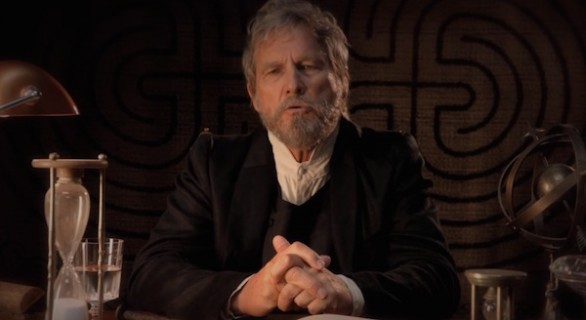“It’s a beautiful poem,” says Jeff Bridges of the novel The Giver, a book he has wanted to bring to the big screen for twenty years.
Bridges wanted to direct a movie and wanted to work with his father, the late actor Lloyd Bridges, so when he saw a children’ novel with a picture of a craggy old man on the cover, he was intrigued. He read the novel by Lois Lowry and knew he had found his story.
“One of the things I really like about the book and the film as well,” he said when we talked by phone this week, “Is that it’s not shoving, you know, messages down the audience’s throat but hopefully it’s provoking some questions and conversation after they see it.”
The story follows Jonas (Brenton Thwaites) a youngster enjoying life in a structured, sterile, and pain-free community. As he comes of age, he apprentices to a mysterious older man (Bridges). Through a mystical connection, this Giver lets him experience the joys, sorrows, and vibrancy of a world that used to be. Jonas finds the security of his utopia comes at an alarmingly high price.
Bridges connected with this idea.
“My personal belief is that us human beings, probably most animals, are kind of addicted to comfort. We like being comfortable and there’s a price to that. What are we willing to pay and what are the true costs of being comfortable and happy?”
In the film, people sacrifice the very core of what makes us human: The ability to choose right and wrong. All choices are made for them, from career to family to curfew. The community is the ultimate triumph of a totalitarian state because the people are no longer aware they are being controlled. The state has won jurisdiction over their minds and quieted their hearts with opiates.
The first task for The Giver is to make Jonas aware that he is not aware.
Like many Hollywood families, the Bridges had a brush with the power of the state. Lloyd Bridges was caught up in the McCarthyist anti-Communism fervor of the 1950s, accused of Communism and asked to testify before the committee.
Bridges sees a link to today:
“I think although the movie takes place in some future time that it is very relective of our own and there’s a bit of a cautionary tale of how us humans roll and what we’re capable of. And the brutality and the subtleties of our brutality toward each other and also the love and the strength that’s inherent in us. Those times [McCarthyism] that you mention were ceratainly dark times that we struggled with. Us human beings are still capable of that kind of thing. We need to be on guard for that and look for that. Not numb ourselves to it. Be engaged. One of the biggest challenges for us at this stage, I know for myself, is to not be cynical, you know, throw up our hands. We need to be engaged.”
Unlike its fellow teen dystopian stories The Hunger Games and Divergent, The Giver is deeply uncynical. While Katniss and Tris struggle to find people worthy of trust and ideas worth fighting for, Jonas and his mentor are deeply motivated by ideals.
The Giver is a parable, a poem, and a lovely one. The film plays with the very notion of our perception of reality using color. It causes the audience to feel, rather than just hear, the vibrancy and beauty of the fullness of life.
When Harvey Weinstein and Walden Media wanted to make the movie that Bridges had loved for so long, was it hard to hand the reins over to someone else?
“I’m a big fan of the book myself, it was so important to me that we do the book justice and that fans of the book also enjoy the movie.”
“This is quite a complex story and vision to put up on screen with the limited time and vision we have. As a producer, I’m glad I helped to cast Philip [Noyce] in that role because we needed somebody who’s really experienced and sensitive and I think he’s the perfect choice.”
“I kind of came to a crossroads, you know, trying to decide whether I was going to get on board or not, because I knew my original vision would be altered… and I could have said ‘Bon voyage, guys, I’m not going to join you but I’m wishing you luck’ because it wouldn’t match my original vision? Or just say ‘You know what? I’m going to kind of do an experiment on myself and I’m going to jump in and work with these guys. And kind of play with the universe and let the story be told to us, and hopefully we’ll all be open to see what the muse of The Giver will do to us, kind of have its way with us.”













